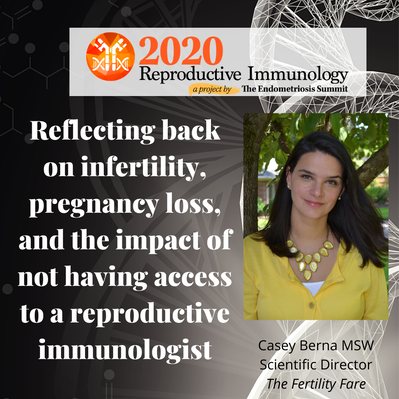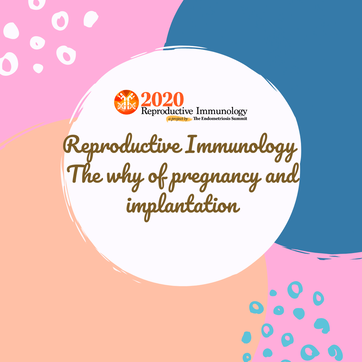



 By Casey Berna, MSW, Endometriosis and Infertility Advocate
By Casey Berna, MSW, Endometriosis and Infertility Advocate
Statistics show 1 in 4 pregnancies miscarry and 1 in 6 couples will struggle conceiving. Despite the frequency of these challenges, needed multidisciplinary care to support those who struggle remains elusive for the majority of patients. Pregnancy loss and infertility not only take a physical toll on the body, but they also impact mental health, especially if there are underlying, chronic conditions. Depression, anxiety, feelings of shame, isolation, intense grief, and a loss of control often afflict those who struggle. But for so many, the stigma of seeking support during these hard to talk about times, and the inaccessibility of mental health care and other supportive services for all persons, makes healing from these often traumatic experiences harder.
Erica M. McAfee, a birth and bereavement doula, is also the founder of Sisters in Loss, an organization dedicated to providing support, education, and awareness surrounding pregnancy loss and shattering the stigmas that can leave so many persons struggling with these issues in silence. As a bereavement doula, Erica shares, “My goal is to always hold space for them creating memories and maximizing the last moments they have with their baby before they have to say goodbye.” Erica decided to become a doula after the stillbirth of her son at 39 weeks and a 2nd trimester loss of her daughter at 18 weeks. She also almost lost her life giving birth to her one living son, which left her unable to have more children. Erica explains, “Becoming a doula for me was giving back to the community that I knew needed the support of going through perinatal loss, bereavement, grief support and healing. Being a bereavement doula serving clients is a unique position because I personally know the pain of losing children and can help walk families on how to navigate those first moments, weeks, and months after their loss.”
Brandon Johnson, a licensed social worker, is a mental health therapist, and infertility coach for men and couples experiencing infertility and pregnancy loss. For men, the stigma of infertility can lead to significant mental health challenges. In Brandon’s work he has found, “Men approach infertility in two different ways depending on who has the diagnosis. If it is the male who is diagnosed, men tend to enter depression almost immediately…Due to the depression, men will slowly begin to isolate themselves, thus ignoring their partner and begin to lose interest in their activities.” Brandon also finds that men will struggle even if it is their partner who is the one diagnosed with infertility, and still may ignore his own feelings. Brandon warns, “Once his own feelings are ignored he can become angry or depressed; in either case he is likely to isolate, and not be forward with communication.” Brandon’s work, which also includes speaking engagements and webinars, focuses on helping “to make men comfortable in their own skin.” In therapy together, he explains, they “walk through the grief of infertility (and pregnancy loss) and help them to regain their identity.”
Parijat Deshpande, a clinically-trained somatic trauma professional and author of the book, “Pregnancy Brain, A Mind-Body Approach to Stress Management During a High-Risk Pregnancy,” helps patients heal from their losses by working with them to release grief through their body and teaching them how to support their bodies after loss. Parijat explains that she also helps “them to navigate the medical system to ensure they’re getting proper medical care the next time they’re ready to pursue fertility treatment or the next time they are pregnant, to reduce their risk of medical errors and help them prepare for a healing birth, instead of a birth that retriggers some of that grief.” When part of a multidisciplinary medical team, her work can create needed spaces for patients to heal and work through their trauma to create a forward moving path of healing.
Unfortunately though, vital services such as bereavement doula care, and therapy are not always available and accessible to all persons in need. An article from Patient Engagement HIT explains, “Limited health insurance access or in-network care are keeping many patients from visiting a mental healthcare professional. And even when a patient can find an affordable provider who will accept insurance, clinician shortages, fragmented care, and societal stigma are getting in the way of adequate care access.” For African Americans, access to care is much harder with one study citing, “a diverse mental health workforce, as well as provider and patient education, are important to eliminating mental health care disparities.” Erica, whose organization is planning an upcoming digital summit, “Breaking Cultural Misconceptions on Infertility and Miscarriage,” sees first hand the impact of health disparities on the physical and mental health and well being of her patients and their babies every day. She explains, “Many patients aren’t given options based on their social economic status, type of healthcare, and how they are perceived by the way they look or carry themselves. Then in turn when they have challenges throughout their pregnancy or delivery not having options costs them their lives or their babies lives.” Black women and Black birthers are most at risk for mental and physical trauma with Erica alerting, “Many patients, rightfully so, put so much hope and trust in our providers not knowing the structural and institutional racism that exists creates a barrier to receiving quality healthcare.”
Leaders in the community have combated some of the barriers to accessing support through creating virtual and in person groups where patients can come out of isolation and be in communion with others who understand what it is like to go through infertility and pregnancy loss. Black Women and Infertility Founder, Shervonne Coney, started her organization, dedicated to supporting women of color through infertility and pregnancy loss, because she had difficulty finding spaces where her experiences were shared and amplified, stating, “I did not see women who looked like me, sharing their infertility journey openly.” She first created a private facebook support group where patients could convene and share support and resources and is now building a directory for patients that includes providers who can give culturally competent care to patients in need.
Executive Director Kate Weldon LeBlanc, whose organization, Resolve New England (RNE), provides many different support groups for individuals and couples struggling to grow their families, has found that having a community is even more vital than usual. “Since the pandemic began, RNE support groups shifted to all virtual, and the response has been great“ said LeBlanc. “We look forward to being together again in person someday, but we will keep offering online groups since they are so convenient. Covid-19 has only amplified the stress, sadness and worry related to family building challenges.” Resolve New England has found many safe ways to best support their patients during the pandemic, also presenting their upcoming annual conference virtually.
Patients have often suffered in silence without the quality multidisciplinary care they require for far too long. Advocates are working to increase awareness, reduce stigma, and create support to help reduce trauma for patients, especially for communities that are particularly vulnerable due to racism and discimination. Erica shares, “My hope for the future of care is that all Black women and Black birthers are listened to, empathized with, understood, and quality care is given to all. Equality is not equity and my hope is that equitable and quality care is given to all no matter their race.”
For more discussions, education, and support regarding infertility and pregnancy loss make sure to sign up for our Virtual Fertility Weekend where you can attend workshops with these speakers and so much more!



